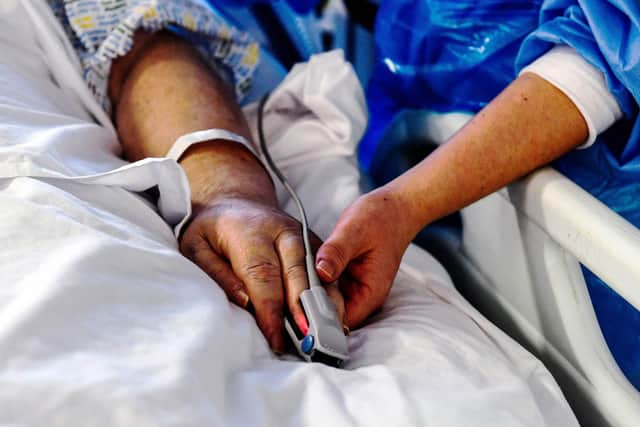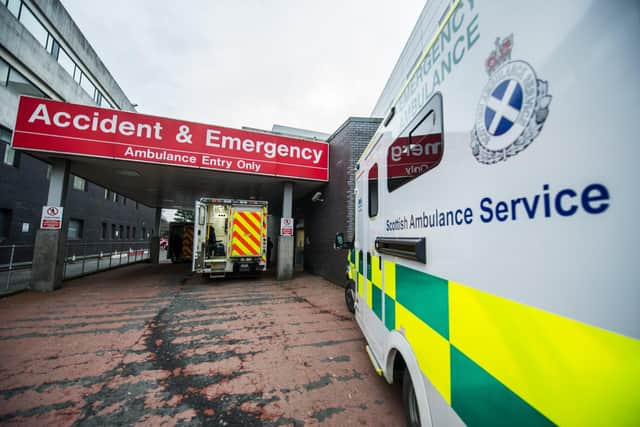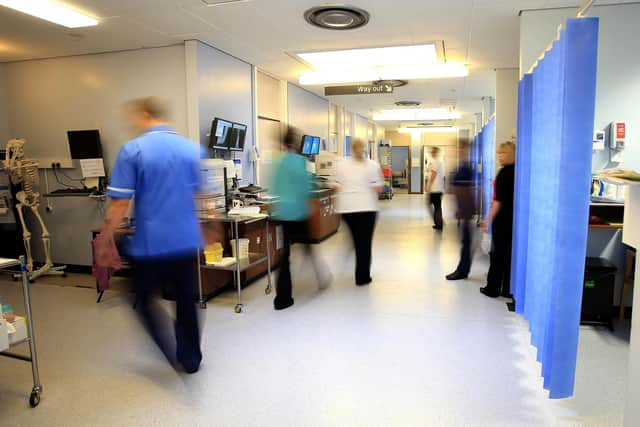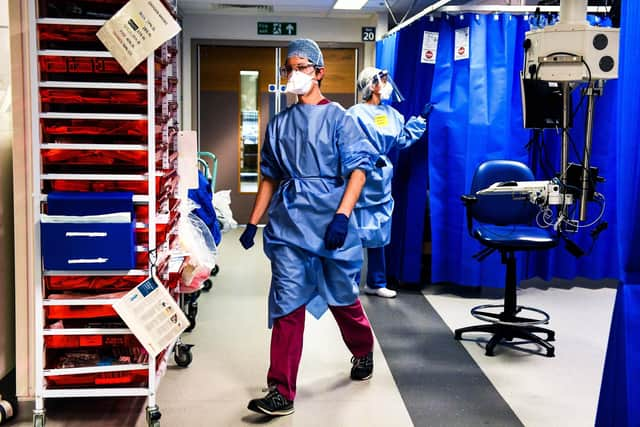Exclusive:NHS Scotland crisis: Top medics on the 'brave decisions' needed to save NHS in warnings to health secretary Neil Gray
NHS Scotland won’t live to reach 100 years of age, top medics have warned, as they called for a wholesale reform of the healthcare system and laid out the challenges new health secretary Neil Gray faces.
Key figures from the British Medical Association (BMA), the Royal College of Nursing (RCN), the Royal College of GPs (RCGP), the Royal College of Emergency Medicine (RCEM) and Scottish Care spoke exclusively to The Scotsman to outline their demands for the reform of Scotland’s NHS.
Advertisement
Hide AdAdvertisement
Hide AdChief among their concerns is the ability to retain staff in the ailing healthcare system, which is struggling to recruit and retain workers amidst low morale, incredibly harsh working conditions and disputes over sub-inflationary pay rises.


Scotland’s NHS is experiencing an intense amount of pressure due to staffing. Firstly, there is an immense Covid backlog to work through, which requires serious resources to tackle.
Secondly, a lack of staff is causing congestion at each stage of a patient’s journey through Scotland’s hospitals. There are limited care placements due to staffing shortages, so vulnerable patients cannot be discharged from wards. Care workers can earn more, and work in a much less demanding environment, such as in supermarkets, and are leaving in their droves.
The hospital wards themselves are staffed by a minimal number of exhausted, overworked and, in the opinion of health leaders, underpaid staff. There are around 5,000 nursing vacancies in Scotland. The health organisations said vulnerable patients who are fit enough to leave have nowhere to go.
The pressure in hospital wards is in turn causing congestion in accident-and-emergency (A&E) departments, where patients cannot be admitted to hospital beds that do not exist. Here too, staff are burned out and looking for the exit, The Scotsman was told.


An A&E medic working in the Central Belt recently said pressures in NHS Scotland’s emergency departments had left staff “wondering how much more they can take”, with the only “good days” coming when doctors feel they “are not running around thinking someone is going to die”.
Waits of over 24 hours have become normalised, as evidenced by the recent revelation that 4,000 Scots waited more than 24 hours in A&E in the first six months of last year – with some managers even admitting “they hope people just don’t turn up”.
Patients have been left waiting outside in ambulances, meaning there are fewer ambulances available to take patients to A&E. There are reports of patients waiting days for an ambulance.
Advertisement
Hide AdAdvertisement
Hide AdAt another of NHS Scotland’s ‘front doors’ – the first point of contact patients have with the NHS before being admitted to hospital – GP networks are said to be in disarray. Patients are presenting with more progressed illnesses than before, a hangover from the coronavirus pandemic, and GPs are leaving or taking reduced hours due to the pressure and low morale.


The BMA said GPs were at “tipping point”, and some practices were “collapsing”. Figures have shown Scotland’s GP coverage has reduced by 3 per cent over a year.
The estimated number of whole-time equivalent (WTE) GPs in Scotland has dropped from 3,613 in 2019 to 3,494 in 2022.
The RCGP recently warned the Scottish Government’s failure to retain and recruit GPs had led to “depleted and demoralised” doctors implementing “never before seen” emergency measures in surgeries, such as texting patients to warn them they can only take emergency appointments.
Dr Iain Kennedy, chair of BMA Scotland, said NHS Scotland was “a system bursting at the seams, with a workforce running on empty”.


“There are not enough of us to give our patients the time and care they need and deserve,” he said. “This winter is highlighting this challenge more starkly than most of us can ever recall.”
The proportion of people waiting longer than four hours in A&E in Scotland has risen sharply, new figures show.
According to Public Health Scotland, just 60.8 per cent of people who attended A&E in the week to December 31 were seen within the Scottish Government’s target time of four hours. This represents a drop from 65 per cent the previous week.
Advertisement
Hide AdAdvertisement
Hide AdThe number of people waiting more than 12 hours during that week also rose by almost a third, from 964 to 1,271, while the number waiting longer than eight hours rose from 2,584 to 3,178.
Dr Kennedy said: “We know we don’t have enough doctors working to meet the demand and the health needs of our population. The Scottish Government must prioritise doing all it can to encourage more doctors to work in Scotland. They need to look at the workload and working conditions that we are asking doctors and other healthcare workers to endure and take on.
“We know that the biggest risk factor to NHS Scotland’s recovery following the Covid-19 pandemic is our ability to retain the doctors we have, and to do that we need to treat them better.
“Far too many of our colleagues across primary and secondary care are leaving the NHS, retiring early or moving away, taking their expertise with them. Our workforce is buckling under the pressure.”
One way to alleviate the pressure in the healthcare system would be to make a career in care more attractive, said Scottish Care’s Karen Hedge. She said that started with “properly valuing workers”.
“The social care workforce is professionally qualified and registered, and yet, the government pays them the living wage and pays providers the equivalent of a living wage to pass on to workers,” she said.
“That's causing huge problems in terms of retention and recruitment.” Ms Hedge said carers could earn a living wage in much less demanding work environments that did not require much training.
The Scottish Government needs to undertake a review of the work carers undertake, Ms Hedge said, “as the role has changed a lot over the last five to ten years”, and to raise the social care worker rate accordingly.
Advertisement
Hide AdAdvertisement
Hide AdThe anti-immigration policies of the UK’s Conservative Government are also wreaking havoc on the care sector’s ability to recruit and retain staff, she said.
Ms Hedge said more and more visas for foreign-born care staff are being refused by the Home Office, as it does not consider care work to be a stable occupation due to the way it is funded in 15-minute increments, and the zero-hour nature of most social care contracts.
In hospital wards, Scotland is facing a vacancy crisis in nursing. Colin Poolman, director of RCN Scotland, said there were around 5,000 nursing and midwifery vacancies in Scotland.
“Nursing is the largest part of the professional workforce,” he said. “If you don't have the right workforce, you will not be able to provide the services that you want to provide.”
There are issues for nursing in both recruitment and retention. In terms of recruitment, fewer and fewer young Scots are choosing a career in nursing.
Figures released this week show the number of applicants for nursing courses in Scotland is down 8.3 per cent compared to the same point last year – something Mr Poolman described as “an extremely worrying trend”.
By the January deadline, 4,650 people had applied to study nursing in Scotland, compared to 5,070 at the same point last year. This is now the third year in a row where there has been a fall in numbers. In Scotland, the number of applicants remains below pre-pandemic levels.
Once in post, nurses are experiencing immense pressure and difficult working conditions, the RCN said.
Advertisement
Hide AdAdvertisement
Hide AdLast year, a nurse from the NHS Lothian area told The Scotsman how working 13-hour shifts in both care home and hospital settings had become the norm.
Over her years working in the NHS, the anonymous nurse said “staffing has reduced while demand has stayed the same”, causing problems for morale and stretching staff across more and more patients.
“Morale is lower, certainly than it was ten years ago”, she said.
A recent RCN survey of more than 1,000 members found 21 per cent had difficulties managing their finances or missed bills in the last year, while 23 per cent had gone without food or skipped meals. Things cannot remain the same, Mr Poolman said.
“There needs to be a discussion with the public about what services should look like going forward,” he said. “And politicians, collectively, should be really clear because the politicians need to get to a position where they can work collectively and collaboratively about what's possible going forward.”
In emergency care, providing more beds would go a long way to alleviating pressure on Scotland’s A&Es, said Dr John-Paul Loughrey, vice-president Scotland of the RCEM.
Dr Loughrey said “the system is failing” and hospitals are “dangerously overcrowded and do not have the space, staff, or resources to provide safe and timely care for the number of patients who need it”.
“There are simply not enough beds to meet demand and hospitals are routinely almost fit to burst, with patients enduring long, undignified waits and demoralised staff forced to deliver treatment in inappropriate areas, such as corridors and car parks,” he said.
Advertisement
Hide AdAdvertisement
Hide Ad“In December 2016, 79 patients in Scotland waited 12 hours before admission. Last December this figure was over 6,000, with vulnerable patients facing the brunt of these extended waits.”
The RCEM has calculated there will be an excess death for every one in 72 patients who spend between eight and 12 hours in an emergency department. Based on the numbers waiting more than eight hours in Scotland since the start of 2023, this would equate to up to 1,635 excess deaths.
In 2022, 142,000 people waited over eight hours in Scotland’s emergency departments, potentially resulting in almost 2,000 excess deaths, according to the RCEM’s methodology.
“It is difficult to describe how it feels to bear witness to this as a healthcare professional, never mind to experience it oneself as a patient,” Dr Loughrey said.
“If the Government is serious about improving the dire conditions currently experienced by the most critically ill in the country, they need to commit now to a sustainable, long-term plan. This means providing more beds – 448 beds across Scotland are needed to bring occupancy to “safe” levels (85 per cent).
“There has been a lot of focus on reducing hospital attendances and admissions, but the real solution would be to improve patient flow through the hospital in a safe way.”
Meanwhile, general practice sits at the frontline of the NHS and provides a 24/7 service, according to the chair of RCGP Scotland, Dr Chris Provan.
In May, The Scotsman revealed how Scotland had lost around 100 GP surgeries over the past decade – roughly one in ten – while patient numbers had swelled due to an ageing population and demographic changes.
Advertisement
Hide AdAdvertisement
Hide AdAs a consequence, there are now 1,687 patients for every full-time-equivalent GP. The impact differs by region – in NHS Lanarkshire, the figure is 2,201 patients per GP, which is the highest in Scotland.
According to Dr Andrew Buist, chair of the BMA's Scottish GP committee, “general practice appears to be failing” in Fife, as 40 per cent of GP surgeries there have closed to new patients. In Edinburgh, one practice has gone from having 3,098 patients in 2018, to 10,718 in April 2023 – an increase of 206 per cent.
NHS Greater Glasgow & Clyde (GGC) has seen the largest reduction in GP surgeries, losing 17 since 2011.
Many GP practices have simply handed their contracts back to their local health board, leaving those health boards managing failing practices which can be two to three times more expensive to run compared to independent practices, according to the BMA.
The RCGP said the Scottish Government must implement “a major shift” to “properly value primary care in the NHS’s long term strategic planning and resourcing” to in turn safeguard general practice.
Dr Provan said: “The issues of recruitment and retention require urgent attention from the Scottish Government if we are to change the course. We need a credible workforce plan, which increases the number of GPs working in Scotland, retains our existing, experienced workforce, and recruits more GPs with a programme of enhanced and extended training.
“Special attention should be given to the needs of the out-of-hours service and remote and rural services.”
Dr Provan called for the Scottish Government to allocate “at least 11 per cent” of the total NHS budget, “to unlock the full potential of an integrated health and social care system”.
Advertisement
Hide AdAdvertisement
Hide AdDr Kennedy, of the BMA, added: “Scotland’s doctors believe in the founding principles of the NHS. We want to provide our patients with the very best health care and treatments that we can.
“Now is the time to have an honest discussion and to take brave decisions about how we deliver the standard of service that we want to provide as doctors, and have come to expect as patients, maintaining that important founding principle that healthcare remains free at the point of use and sustainable in the long term.
“There was much celebration last year to mark its 80th anniversary. However, I fear that without concerted effort, starting immediately, the NHS will not reach its centenary in 2048.”
Comments
Want to join the conversation? Please or to comment on this article.